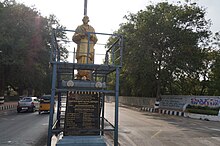Veturi Prabhakara Sastri (7 February 1888 – 29 August 1950) was a Sanskrit and Telugu scholar, editor, translator and historian. He was born in the town of Pedakallepalli in the Krishna District of Andhra Pradesh. He was known for deciphering a few thousand of Annamayya's composition during his tenure at the Devasthanam Oriental Institute.[1] He is also recognized for his scholarship on Telugu poet Srinatha's work.[2] Veturi was involved in researching lost texts and forgotten literature, and he is regarded for his enlightened and liberal scholarship that was free of literary or religious prejudices.[3]
Veturi Prabhakara Sastri | |
|---|---|
 | |
| Born | 7 February 1888 Pedakallepalli, Krishna District, Andhra Pradesh, India |
| Died | 29 August 1950 |
| Occupation | Telugu scholar and editor |
| Relatives | Veturi (nephew) |

Work
editAs a publisher and writer, he introduced to the Telugu people several antiquated texts, in association with Manavalli Ramakrishna Kavi from prachya likhita pustaka bhandagaram (library of ancient scripts). He discovered the copper scripts of Annamayya's poetry and introduced them to Telugu people.[4] Similarly, he unearthed palm scripts of Ranganatha's Ragadalu. He published Tanjavuri Andhra Rajula Charitra, Srinatha Vaibhavamu, Sringara Srinatham, Manu Charitra, Basava Puranam etc. with elaborate introductions. He translated Bhasa's Pratima Natakam, Karnaabharam and Madhyama Vyayogam.
Veturi Prabhakara Sastry was also an editor of Ayurvedic texts. He edited and wrote an introduction for an Ayurvedic text called the Carucarya for a patron, the then-Raja of Muktyala.[5][6] He also edited the 'Ballad of the Battle of Yerragaddapadu' written by Gangula Pinayellaya.[7] Veturi also edited many Hindu religious satakams and stavams in praise of Venkateshwara, such as Venkatachala Vihara Satakam.[8] Veturi Prabhakara Sastry was also a translator. He rendered the classical Sanskrit farcical play 'Bhagavadajjukam' of Bodhyanakavi into Telugu, and he translated a Sanskrit farcical play 'Mattavilasaprahasanam' into a Telugu work entitled 'Mattavilasamu.'[9]
Vangmaya Peetham
editTirumala Tirupati Devasthanams (TTD) established "Sriman Veturi Prabhakara Sastri Vangmaya Peetham" in 2007 to publish his books and research works.[10] A life-size bronze statue of Sri Veturi was installed before the SVETA Complex in Tirupati.[11]
References
edit- ^ Ramesan, N. (1981). The Tirumala Temple. Tirumala Tirupati Davasthanams. p. 279.
- ^ Rao, Velcheru Narayana; Shulman, David (21 March 2012). Srinatha: The Poet who Made Gods and Kings. Oxford University Press. p. 9. ISBN 978-0-19-986304-4.
- ^ Siva's Warriors: The Basava Purana of Palkuriki Somanatha. Princeton University Press. 14 July 2014. p. 20. ISBN 978-1-4008-6090-6.
- ^ "Tributes paid to Veturi Prabhakara Sastry". The Hindu. 30 August 2008. Retrieved 6 June 2018.
- ^ REDDY, D. V. S. (1950). "A Note on "Carucarya" of Bhoja". Bulletin of the History of Medicine. 24 (2): 187–189. ISSN 0007-5140. JSTOR 44443510.
- ^ Krishnamurthi, Salva (1996). A History of Telugu Literature. Institute of Asian Studies. p. 168.
- ^ Folk Culture: Folk culture & literature. Institute of Oriental and Orissan Studies. 1983. p. 220.
- ^ Ramesan, N. (1981). The Tirumala Temple. Tirumala Tirupati Davasthanams. p. 209.
- ^ Sinha, Biswajit (2000). Encyclopaedia of Indian Theatre: South Indian Theatre. Raj Publications. p. 124. ISBN 978-81-86208-54-0.
- ^ "Sriman Veturi Prabhakara Sastry Vangmaya Peetam". Archived from the original on 29 May 2010. Retrieved 29 March 2010.
- ^ "Statue of litterateur Veturi Prabhakara Sastri unveiled". The Hindu. 8 February 2008. Retrieved 6 June 2018.